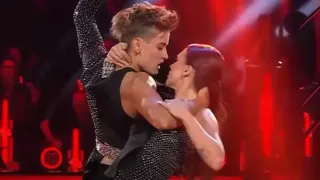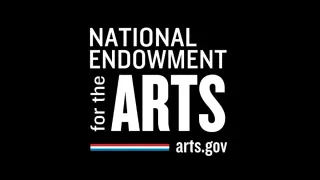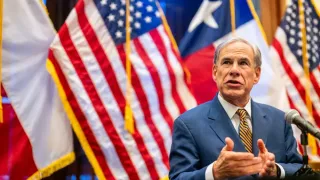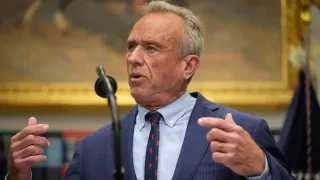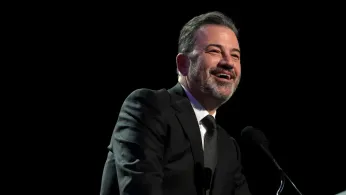
3 hours ago
Jimmy Kimmel Slams 'Dangerous' Trump During Triumphant TV Return
READ TIME: 4 MIN.
Jimmy Kimmel, the longtime host of ABC’s “Jimmy Kimmel Live!,” made a headline-grabbing return to television on September 23, 2025, following a six-day suspension that drew national attention. Kimmel’s comeback was marked by a pointed critique of former President Donald Trump, whom he labeled “dangerous” for his persistent attacks on media freedom and his divisive rhetoric. The episode immediately sparked widespread discussion about the role of late-night television in confronting political power and defending marginalized communities—including LGBTQ+ people—against bullying and censorship .
Kimmel’s suspension stemmed from comments made about the death of Charlie Kirk, a conservative activist, which were interpreted by some as insensitive. The network’s decision to pull Kimmel off the air prompted fierce debate about the boundaries of satire, freedom of expression, and the responsibility of broadcasters. In the wake of his suspension, Kimmel received support from fellow late-night hosts, fans, and even critics who, while disagreeing with his views, defended his right to share them. This outpouring of solidarity underscored the importance of media diversity in a polarized era .
Upon Kimmel’s reinstatement, Donald Trump took to his social media platform, Truth Social, to denounce both Kimmel and ABC. Trump accused the network of “putting itself in jeopardy” and labeled Kimmel as an extension of the Democratic National Committee. He further suggested retaliatory action against ABC, referencing previous disputes and threatening financial and reputational consequences for the network. Trump’s remarks included: “Why would they want someone back who does so poorly, who’s not funny, and who puts the Network in jeopardy?” This escalation led to renewed concerns about the influence of political leaders on media independence and the safety of journalists and entertainers who challenge authority .
On his first night back, Kimmel directly addressed the controversy, expressing his gratitude for the support he received from both sides of the political spectrum. He clarified that it was never his intention to make light of a tragedy and reiterated the value of living in a country where diverse viewpoints can be shared on national television. Kimmel’s remarks highlighted the fragility of free speech in the current climate, especially for those whose identities or perspectives may not align with dominant power structures. “It’s important that we have a show like this, where we can talk about what matters—even when those in power don’t agree,” Kimmel said during his monologue .
Kimmel’s defense of free speech and his condemnation of political bullying resonate strongly with LGBTQ+ advocates, who have long faced attempts to silence their voices both in media and politics. The recent surge in anti-LGBTQ+ legislation and rhetoric has made the protection of diverse perspectives even more critical. Several LGBTQ+ organizations responded positively to Kimmel’s statements, emphasizing the role of mainstream media in amplifying marginalized voices and challenging dangerous narratives that threaten equality and safety.
Sarah Kate Ellis, president and CEO of GLAAD, commented in a statement: “When public figures stand up to bullying and defend free speech, it sends a powerful message to LGBTQ+ people everywhere that their voices matter. It’s vital that networks like ABC continue to support talent who use their platforms to push back against hate and misinformation” .
The clash between Kimmel and Trump reflects broader tensions in American society over the limits of free expression and the responsibilities of media organizations. The debate is especially relevant for communities at higher risk of censorship and discrimination, including transgender people, nonbinary individuals, and LGBTQ+ people of color. In recent years, political attacks on late-night hosts, journalists, and activists have become more common, raising alarms about the erosion of democratic norms.
A report by the Human Rights Campaign notes that “attempts to intimidate journalists and entertainers who speak out for LGBTQ+ equality are part of a larger strategy to roll back civil rights and silence dissent. These tactics have real consequences for vulnerable communities” .
Kimmel’s return also reignited discussion about the boundaries of satire and the role of comedy in political discourse. Late-night television has historically provided a space for critique and humor, often serving as a counterweight to political power. Advocates argue that restricting comedians’ ability to address controversial topics risks undermining the social function of comedy and chilling important conversations.
Media ethicist Dr. Jane Martens of Columbia University explained: “Satire is not just entertainment—it’s a vital part of our collective conversation. When comedians are punished for challenging authority, it sends a dangerous signal about who gets to speak and who is silenced. This is especially concerning for LGBTQ+ people, who rely on inclusive media to advocate for their rights” .
In the aftermath of the suspension and Trump’s threats, Kimmel expressed appreciation for the solidarity shown by fellow hosts, viewers, and even some critics. He emphasized that defending free speech is not a partisan issue but a democratic imperative. For LGBTQ+ audiences, the episode serves as a reminder of the importance of visibility, allyship, and resilience in the face of adversity.
ABC has not commented publicly on the specifics of Kimmel’s suspension, but insiders suggest the network is reviewing its policies on satire, political commentary, and protection for its talent. LGBTQ+ organizations continue to monitor the situation, urging media outlets to maintain strong commitments to diversity and inclusion.
Jimmy Kimmel’s high-profile TV return and his confrontation with Donald Trump have sparked urgent conversations about free speech, political bullying, and marginalized voices in media. The episode’s significance extends far beyond the confines of late-night television, touching on core issues of democracy, equality, and the ongoing struggle for LGBTQ+ rights. As the political climate intensifies, advocates and allies reaffirm the need for inclusive media spaces that defend the right to speak truth to power and uplift communities who have historically been silenced .

